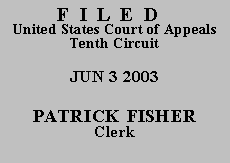

| UNITED STATES OF AMERICA, |
|
| v. |
|
| FRANCIS EDWARD SPRINGFIELD, |
Mr. Springfield was convicted after a jury trial of possession with intent to distribute methamphetamine and aiding and abetting; carrying a firearm during a drug trafficking offense; being a felon in possession of a firearm; and being a felon in possession of ammunition. In November 1999 we affirmed his convictions on direct appeal, but remanded for resentencing under 18 U.S.C. § 924(e), the Armed Career Criminal Act (ACCA). See United States v. Springfield, 196 F.3d 1180 (10th Cir. 1999).
On July 8, 2002, he filed in district court his § 2255 motion, in which he (1) challenges a 1973 plea of guilty to a Wyoming escape charge used to enhance his sentence under the ACCA, on the grounds that the guilty plea was not knowing and voluntary and was obtained in violation of due process; and (2) argues that the use of the escape conviction to enhance his sentence violated the Ex Post Facto Clause. The district court denied his motion on July 17, 2002, on the ground that it was time-barred under the one-year limitations period of 28 U.S.C. § 2255. The court noted that even if the motion was timely, it would be denied because it lacked merit. On July 30, 2002, Mr. Springfield filed a motion to reconsider that decision; the district court denied the motion on December 17, 2002. This request for a COA followed.
A review of the appellate record and this court's own files reveals that this is Mr. Springfield's second motion for relief under § 2255. On January 3, 2002, this court denied Mr. Springfield a COA and dismissed his appeal from a district court order dismissing with prejudice an earlier § 2255 motion directed at his sentence for the convictions we affirmed in November 1999. See Springfield v. Fed. Corr. Inst. Englewood, 54 Fed. Appx. 909 (10th Cir. 2002) (unpublished). Thus, the § 2255 motion Mr. Springfield filed on July 8, 2002, was a second motion for relief under § 2255. Mr. Springfield may not file a second or successive § 2255 motion until he "move[s] in the appropriate court of appeals for an order authorizing the district court to consider the application." 28 U.S.C. § 2244(b)(3)(A); see also 28 U.S.C. § 2255 ("A second or successive motion must be certified as provided in section 2244 by a panel of the appropriate court of appeals . . . ."). Because Mr. Springfield filed his second § 2255 motion without first requesting permission from this court, the district court lacked subject matter jurisdiction to decide the motion, and we must vacate the district court's July 17, 2002, Order. See United States v. Gallegos, 142 F.3d 1211, 1212 (10th Cir. 1998).
Nevertheless, we will construe Mr. Springfield's request for a COA and his appellate brief as an application for authorization to file a second § 2255 motion. See United States v. Torres, 282 F.3d 1241, 1246 (10th Cir. 2002); Gallegos, 142 F.3d at 1212. We may authorize the filing of a second or successive § 2255 motion only if we determine that the motion contains:
(1) newly discovered evidence that, if proven and viewed in light of the evidence as a whole, would be sufficient to establish by clear and convincing evidence that no reasonable factfinder would have found the movant guilty of the offense; or
(2) a new rule of constitutional law, made retroactive to cases on collateral review by the Supreme Court, that was previously unavailable.
28 U.S.C. § 2255.
Mr. Springfield's motion makes no claim of newly discovered evidence and submits no argument relying on a new rule of constitutional law made retroactive by the Supreme Court. Accordingly, we VACATE the district court's July 17, 2002, Order denying Mr. Springfield's unauthorized § 2255 motion, DENY Mr. Springfield's implied application for leave to file a second or successive § 2255 motion in the district court, and DENY his request to proceed IFP. Mr. Springfield is reminded that this court's denial of authorization to file a second or successive § 2255 motion cannot be subject to a petition for rehearing or a petition for writ of certiorari. See 28 U.S.C. § 2244(b)(3)(E).
ENTERED FOR THE COURT
Harris L Hartz
Circuit Judge
*.After examining the briefs and appellate record, this panel has determined unanimously that oral argument would not materially assist the determination of this appeal. See Fed. R. App. P. 34(a)(2); 10th Cir. R. 34.1(G). The case is therefore ordered submitted without oral argument. This order and judgment is not binding precedent, except under the doctrines of law of the case, res judicata, and collateral estoppel. The court generally disfavors the citation of orders and judgments; nevertheless, an order and judgment may be cited under the terms and conditions of 10th Cir. R. 36.3.